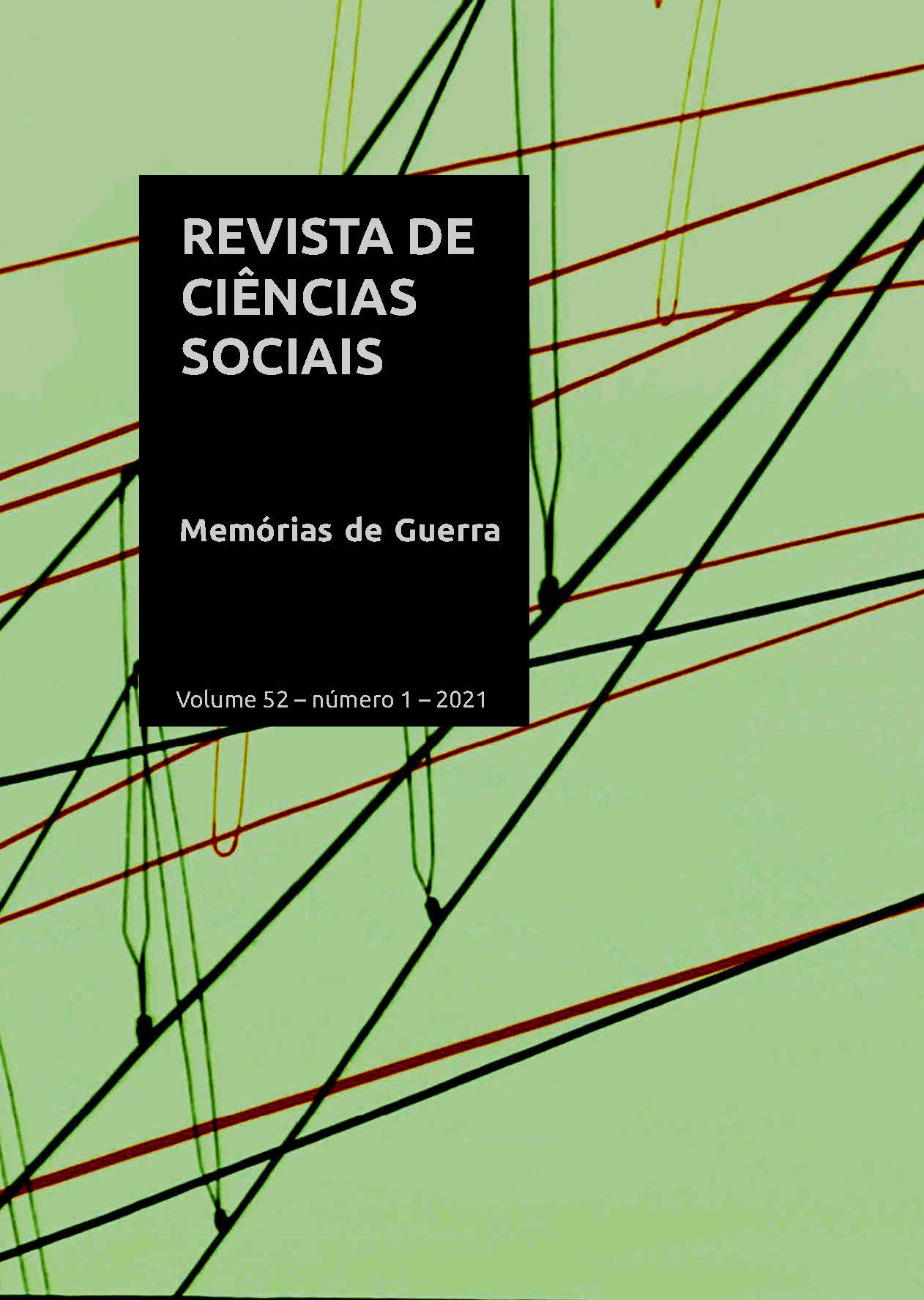The social order in Max Weber's theory
DOI:
https://doi.org/10.36517/10.36517/rcs.52.1.a06Keywords:
Max Weber, Macrosociology, Social OrderAbstract
The updated studies of Max Weber's writings question his status as a “methodological individualist.” By pursuing these anti-reductionist efforts, it is possible to see in his methodological writings (Kategorien, 1913 and Grundbegriffe, 1921) a macrosociology of social orders that will be discussed in the present paper. In formal terms, Weber conceives order as the macro-level culmination, in both texts. In substantive terms, the order is exposed as a regulation of the social relationship that has formal validity in 1913. However, in 1921, when there is an insertion of the moral-normative element of legitimate validity, the order is described as a set of duties considered as mandatory maximum for actions. Therefore, Weber stops thinking of order only in terms of the law (established order) and starts to articulate his reasoning from politics (legitimate order).
References
ALBERT, Gert. Holismo Metodológico Moderado: uma interpretação weberiana do modelo macro-micro-macro. Política & Sociedade, Florianópolis, v. 15, n. 34, 2016.
ALBERT, Gert et al. Das Weber-Paradigma. Tübingen: Mohr Siebeck, 2003.
COLLIOT-THÉLÈNE, Catherine. Prefácio. In: WEBER, Max. Le savant et le politique. La profession et la vocation de savant. La profession et la vocation de politique. Paris: La Découverte, 2003.
COLLIOT-THÉLÈNE, Catherine. A sociologia de Max Weber. Petrópolis: Editora Vozes, 2016.
COHN, Gabriel. Max Weber. São Paulo: Editora Ática, 2000.
ESSER, Hartmut. Geltung, Legitimität und Herrschaft. In: _____. Soziologie Spezielle Grundlagen: Institutionen. Frankfurt: Campus Verlag, 2000.
GRAFSTEIN, Robert. The Failure of Weber's Conception of Legitimacy: Its Causes and Implications. The Journal of Politics, v. 43, n. 2, 1981.
GROSSEIN, Jean-Pierre. De l’interprétation de quelques concepts wébériens. Revue française de sociologie, 2005a, n. 4, v. 46.
GROSSEIN, Jean-Pierre. Max Weber “à la française”? De la nécessité d'une critique des traductions. Revue française de sociologie, v. 46, n. 4, 2005b.
KALBERG, Stephen. Max Weber's Comparative-Historical Sociology Today: Major Themes, Modes of Analysis, and Applications.* London: Routledge, 2012.
LASSALE, Ferdinand. O que é uma Constituição. Belo Horizonte: Editora Líder, 2002.
LEPSIUS, Rainer. Max Weber and institutional theory. Suíça: Springer, 2017.
LUHMANN, Niklas. Legitimationdurch Verfahren. Darmstadt: Luchterhand Verlag, 1975.
MERQUIOR, José Guilherme. Rousseau e Weber: dois estudos sobre a teoria da legitimidade.* Rio de Janeiro: Editora Guanabara, 1990.
ORIHARA, Hiroshi. From “A Torso with a Wrong Head” to “Five Disjointed Body-Parts without a Head”: A Critique of the Editorial Policy for Max Weber-Gesamtausgabe I/22. Max Weber Studies, v. 3, n. 2, 2003.
PARSONS, Talcott. The institutionalization of authority. In: WEBER, Max. The theory of social and economic organization. Nova York: Oxford University Press, 1947.
ROSSI, Pietro. Max Weber: una idea di Occidente. Roma: Donzelli, 2007.
SCHLUCHTER, Wolfgang. Handlung, Ordnung und Kultur. Heidelberg: Mohr Siebeck, 2005.
SCHLUCHTER, Wolfgang. Os conceitos sociológicos fundamentais: a fundamentação da sociologia compreensiva de Max Weber. In: O desencantamento do mundo: seis estudos sobre Max Weber. Rio de Janeiro: Editora UFRJ, 2014.
SCHLUCHTER, Wolfgang. Max Weber Später Soziologie. Tübingen: Mohr Siebeck, 2016.
SELL, Carlos Eduardo. Weber no século XXI: desafios e dilemas de um paradigma weberiano. DADOS — Revista de Ciências Sociais, Rio de Janeiro, v. 57, n. 1, 2014.
SELL, Carlos Eduardo. Resenha de: (MWG/12) — Sociologia Compreensiva e controvérsia sobre os valores. Escritos e Alocuções: 1908-1917. Tempo Social, revista de sociologia da USP, v. 30, n. 3, 2018a.
SELL, Carlos Eduardo. Poder instituído e potência subversiva: Max Weber e a dupla face da dominação carismática. Revista Brasileira de Ciências Sociais, v. 33, n. 98, 2018b.
STAMMLER, Rudolf. Wirtschaft und Recht nach der materialistischen Geschichtsauffassung. Leipzig: Verlang von Veit & Com., 1896.
VILLEGAS, Gil. Revisões e comentários. In: WEBER, Max. Economía y sociedad. México: FCE, 2014.
WEBER, Max. [MWG I/23] Wirtschaft und Gesellschaft: Soziologie (1919–1920). Knut Borchardt, Edith Hanke e Wolfgang Schluchter (Eds.) Tübingen: Mohr Siebeck, 2013.
WEBER, Max. Economia e sociedade: fundamentos da sociologia compreensiva. Tradução de Regis Barbosa e Keren Elsabe Barbosa. Brasília: Editora Universidade de Brasília, 2015.
WEBER, Max. Metodologia das Ciências Sociais. Tradução de Augustin Wernet. São Paulo: Cortez; Campinas: Editora Unicamp, 2016.
WEBER, Max. [MWG I/12] Verstehende Soziologie und Werturteilsfreiheit: schriften und reden (1908-1917). Johannes Weiss e Sabine Frommer (Eds.) . Tübingen: Mohr Siebeck, 2018.
WEISS, Raquel; BENTHEIN, Rafael Faraco. 100 anos sem Durkheim, 100 anos com Durkheim. Sociologias, Porto Alegre, n. 44, 2017.
Published
How to Cite
Issue
Section
License
Autores que publicam nesta revista concordam com os seguintes termos:- Autores mantém os direitos autorais e concedem à revista o direito de primeira publicação, com o trabalho simultaneamente licenciado sob a Creative Commons Attribution License, que permite o compartilhamento do trabalho com reconhecimento da autoria do trabalho e publicação inicial nesta revista.
- Autores têm autorização para assumir contratos adicionais separadamente, para distribuição não-exclusiva da versão do trabalho publicada nesta revista (ex.: publicar em repositório institucional ou como capítulo de livro), com reconhecimento de autoria e publicação inicial nesta revista.
- Autores têm permissão e são estimulados a publicar e distribuir seu trabalho online (ex.: em repositórios institucionais ou na sua página pessoal) a qualquer ponto antes ou durante o processo editorial, já que isso pode gerar alterações produtivas, bem como aumentar o impacto e a citação do trabalho publicado (Veja O Efeito do Acesso Livre).



